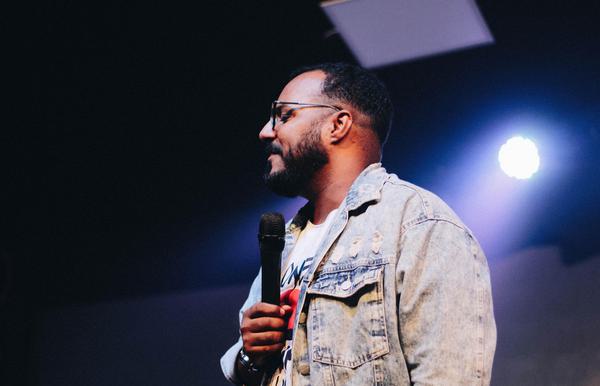Is busyness and fear killing your youth ministry? How can you find hope in your work when it feels like loss and decline?
As a small boy, I was oddly fascinated by gardening (I was a strange kind of child). I was particularly fascinated by the idea of cuttings: take off a fresh shoot of growth, pot it up in a little bit of soil and – as if my magic – it will begin to sprout roots and you will have a new plant. I found the process infinitely interesting.
Unfortunately, 11-year-old David was not the most patient of souls. And so, instead of leaving the new shoots to sit in the compost for a few weeks whilst nature did its thing, I used to pull them up out of the soil every day (sometimes several times a day) to check to see if roots were beginning to form.
Inevitably, the plants failed to thrive with such heavy handed ‘love’.
Why busyness is bad for young people
In my previous blog post, looking at what Charles Taylor’s concept of a ‘Secular Age’ means for youth work, I channelled Billie Joel’s Vienna to look at what the constant urge to be busy and to do more did to us as youth workers. ‘We need to make youth group attractive and entertaining’, I said, ‘otherwise people might not come.’ And I looked at how that could be crushing to our own souls.
I want to look at this theme again here, but looking not at what it does to us as youth workers, but what it does to the young people that we are called to love and minister to. In his book, Faith Formation in a Secular Age, theologian Andrew Root puts youth ministry on the psychotherapist’s couch. He shows how we as Christians are often telling what he calls a ‘narrative of loss’ – in effect, we are looking back at how much cultural ground has been lost in the last few decades and are worried about the future of the Church. It was all better back then – even nostalgia isn’t what it used to be.
A story of loss often produces a great amount of busy work. If you are telling yourself that the boat you are sailing in has a hole and is sinking, of course you are going to dedicate a lot of your energy to bailing it out. In the same way, if you have a story that tells you that churches are haemorrhaging young people, you are going to become nervous. This is why, Root says, we often try and counter-act this loss with more: more strategies, more programs, more activities, more mission trips, more mission trips, more parental involvement: ‘These approaches seem appealing, because they promise action in the anxiety of loss. When valuable things are racing toward the drain, quick action is preferred (p. 99)’.
"Through our crowded, frantic activity, maybe we risk bulldozing over the space in which God will work, in his own sweet time and at his own speed."
Root moves on to begin to argue that maybe this narrative of loss isn’t such a good diagnosis after all. But I want to linger here for a little bit. Particularly, I am interested in this idea of the anxiety that this narrative of loss creates. Fear, as I have written before, does strange things to us – and I think the fear that the boat is sinking, that the next generation is about to disappear, can be a particularly potent fear. Maybe we also feel the others’ fear projected onto us: the PCC that seems to hold us responsible for keeping the teenagers in church (but not too disruptive) on 12 hours a week and £4000. Whilst building a team from the ground up…
A narrative of loss?
What does a narrative of loss and its associated fear do to those to whom we minister to? I’m not sure if you have ever been on the end of a hard sale – perhaps whilst walking down the high street, or in a phone conversation. You know – one of those conversations where it is difficult to say ‘no’, even if you don’t really want to buy a life-size replica of Theresa May or insurance against chickenpox or to support endangered goldfish in the Gulf of Mexico. It feels quite oppressive, right?
I wonder if we sometimes communicate a similar feeling to our teenagers through our well-intentioned strategies, programmes, and ministries. Are we sometimes maybe like 11-year-old David – constantly pulling up the shoots of potential new growth to see if anything has taken root?

This month in my quiet time I have been reading through Acts alongside an excellent commentary by black theologian Willie James Jennings. Discussing Acts 1, he asks what kind of power the disciples might have been expecting when the Spirit came. He talks about how, when we feel threatened by a changing world, we often have fantasy dreams about having ‘power over’ someone – power to enforce our view of reality, or at least how reality should be.
I wonder if the same temptation might be there in our responses to narratives of loss. More programmes, more strategies, more talks – and of course the teenagers will respond. Why wouldn’t they? I wonder if our young people pick up subconsciously on our unspoken expectations for them. On our dreaming of revival, a great reversal to the time when the church was ‘strong’ again, crowds of young people in bold discipleship.
Just like with the insurance salesman – do our young people really feel the freedom to say ‘no’? To say: ‘Jesus just isn’t for me right now?’
Or do they pick up on our fear and say something they don’t fully mean because they don’t want to disappoint us.
Who are we acting for? Whose interests are subconsciously driving our actions?
If we are constantly plucking our cuttings out of the soil, checking them anxiously for signs of growth – signs of a future for the church! – then we leave them no space and freedom to truly respond. And through our crowded, frantic activity, maybe we risk bulldozing over the space in which God will work, in his own sweet time and at his own speed.
What do we say to this?
Fear or love?
Acts 2, of course, is the counterpoint to Acts 1. The disciples’ own plans, the disciples’ temptations towards ‘power over’ were interrupted by the sheer incongruity of God’s divine initiative, a revolution of the divine love. At Pentecost God moved in a completely new and unexpected way – something that the disciples in Acts 1 would have been unable to predict or expect or hope for.
And this, I think, is our hope.
Whatever stories we tell ourselves, whatever anxieties we bring into our ministry – God is neither surprised nor disappointed not fretful about the future. Instead, he remains graciously Lord over the future of His Church.
To minister to young people, then, is to learn to put to death our fretful handwringing and our busy bailing out of water. We are called to attend to the anxieties within us as we learn to wait upon the surprising God of grace, who simply delights to interrupt our lives and the lives of our young people. In short: we are called to learn to trust.
And, when our anxieties are stilled and our souls are calmed, then we are freed up to love young people. Love not to change or manipulate them into a response, or to woo them with our incredible programmes or our great visions of revival. But simply to love in a way that says: ‘I delight in you, however you respond to Jesus at this point of your journey’.












